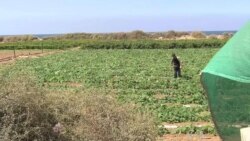GAZA STRIP —
An offensive by Egypt’s new government against militants in the Sinai Peninsula has destroyed most of the smuggling tunnels to Gaza. The resulting job losses and shortages of agricultural supplies are squeezing the livelihoods of local farmers.
Mohamed Shamalak and his family have farmed this one-hectare plot of land for three generations. It used to yield dozens of crates of peppers, cucumbers and lettuce each season.
Its location on a major highway running almost the entire length of Gaza provided a steady stream of customers. That is not the case today, though.
"The people are tired [poor]. I've just picked two boxes [about 20 kg] of cucumbers, and since this morning I've sold only one kilo. People find them too expensive. Everything is costly," said Shamalak.
Since the Egyptian government destroyed the smuggling tunnels into Gaza and restricted access to the Rafah Crossing, said Shamalak, prices for fertilizer have skyrocketed. This aggravated a six-year blockade by Israel. The Egyptian government says militants were using the tunnels to stage attacks in the Sinai Peninsula.
Many Gazans doubt this. They think Egypt’s new leaders are trying to undermine the governing Hamas movement, which supported deposed Egyptian President Mohamed Morsi and his Muslim Brotherhood.
Shamalak says many more Gazans are out of work now. He has had to lower his prices and is barely breaking even.
"The solution is for things to return like they were, open the Crossing, re-open the tunnels, so that all the workers can return to their jobs," said Shamalak.
That does not appear likely under the new government in Cairo. So all farmers can do is try to hold on and hope things eventually change.
Mohamed Shamalak and his family have farmed this one-hectare plot of land for three generations. It used to yield dozens of crates of peppers, cucumbers and lettuce each season.
Its location on a major highway running almost the entire length of Gaza provided a steady stream of customers. That is not the case today, though.
"The people are tired [poor]. I've just picked two boxes [about 20 kg] of cucumbers, and since this morning I've sold only one kilo. People find them too expensive. Everything is costly," said Shamalak.
Since the Egyptian government destroyed the smuggling tunnels into Gaza and restricted access to the Rafah Crossing, said Shamalak, prices for fertilizer have skyrocketed. This aggravated a six-year blockade by Israel. The Egyptian government says militants were using the tunnels to stage attacks in the Sinai Peninsula.
Many Gazans doubt this. They think Egypt’s new leaders are trying to undermine the governing Hamas movement, which supported deposed Egyptian President Mohamed Morsi and his Muslim Brotherhood.
Shamalak says many more Gazans are out of work now. He has had to lower his prices and is barely breaking even.
"The solution is for things to return like they were, open the Crossing, re-open the tunnels, so that all the workers can return to their jobs," said Shamalak.
That does not appear likely under the new government in Cairo. So all farmers can do is try to hold on and hope things eventually change.





